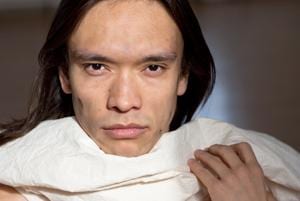“All of my work is about loss in some ways,” says choreographer Michael Caldwell. “It may be the loss of innocence, a loved one or mental capacity. I find myself drawn to it over and over because it’s a universal topic we all have to deal with at some point, whether we want to or not.”
The Pittsburgh-born, Toronto-based dance artist began work on Ash Unravel in 2008, while mourning the death of his mother. Trying to process what he was feeling, he went into the studio to begin translating emotions into physical vocabulary. While the movements came quickly, the pieces didn’t seem to fit together, and Caldwell gradually realized there was a missing element.
“I had no connection to my mother’s cultural heritage,” he says. “There was an intensity to what I was doing physically, but it felt misplaced. I realized I needed to learn more about my personal history before I could move forward.”
Caldwell’s father was an American military police officer serving in the Vietnam War when he met the woman who would one day be his wife. Caldwell’s mother would bring food to the troops serving in her village, and the two struck up a romance. When Caldwell’s father returned to the US, he sponsored Caldwell’s mother to join him, and they married shortly after. Though he was familiar with the story of their courtship, Caldwell knew virtually nothing of his mother’s life before that.
“My mother was a very private woman, and she didn’t really tell me anything about her personal history while I was growing up,” Caldwell says. “If anything, she tried to shield me from knowing anything about who she was or where she came from.”
While many immigrants try to keep their children connected with their history, Caldwell’s mother chose not to introduce her son to her culture. As an immigrant from a nation with which the US was still waging war, she faced every imaginable form of racism and discrimination long after she arrived in the States in 1971. Determined to spare her son the same experience, she made every effort to raise him as an American, keeping him ignorant of his cultural heritage.
In 2010, still processing his mother’s death and struggling with the project, he decided to make his first trip to Vietnam. While travelling from Ho Chi Minh City to his mother’s countryside village of Can Tho, the pieces all started to fall into place.
“I remember feeling innately like I belonged there, more than anywhere I had ever been,” he says. “I’m not a journalling person, but I wrote every day I was there. It completely changed my perspective on myself and my parents. I know it sounds cliché, but it was a life-changing experience.”
But the journey had effects far beyond shaping Caldwell’s current project; it unlocked a part of himself he had never really been able to access.
“When I was growing up, I always had a difficult time expressing emotion,” he says. “I often felt like I was removed from my own experience. What I realized from my mom passing and being in Vietnam was that I can actually let these things out. It’s made me a better son, a better husband and a better lover.”


 Why you can trust Xtra
Why you can trust Xtra


